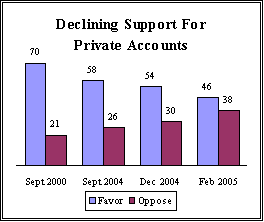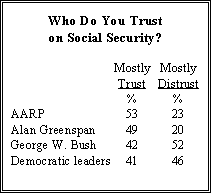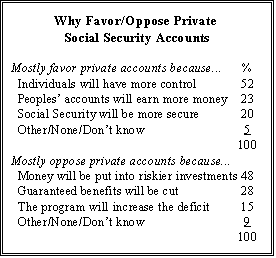Summary of Findings

President George W. Bush is losing ground with the public in his efforts to build support for private retirement accounts in Social Security. Despite Bush’s intensive campaign to promote the idea, the percentage of Americans who say they favor private accounts has tumbled to 46% in Pew’s latest nationwide survey, down from 54% in December and 58% in September. Support has declined as the public has become increasingly aware of the president’s plan. More than four-in-ten (43%) say they have heard a lot about the proposal, nearly double the number who said that in December (23%).
The new poll indicates that the Social Security debate is packing a powerful political punch. It finds that just 29% of Americans approve of the way that Bush is handling the issue. This is the president’s lowest approval rating for any policy area, and is considerably lower than his overall job approval rating of 46%. Moreover, by a 65%-25% margin, most say the president has not explained his Social Security proposal clearly enough.

Further, the public expresses much more confidence on this issue in the AARP, which is strongly opposed to private accounts, than they do in the president or in Republican congressional leaders. However, Federal Reserve Board chairman Alan Greenspan, who has offered a qualified endorsement of Bush’s plan, also is widely trusted on Social Security. And while just 42% say they mostly trust Bush on Social Security, Democratic congressional leaders earn no more trust than the president (41%).
The latest national survey by the Pew Research Center for the People & the Press, conducted Feb. 16-21 among 1,502 Americans, suggests that the public agrees with Bush that the Social Security system is facing funding problems. Two-thirds (67%) think that the Social Security program will run short of money in the future.

Yet even among supporters of private retirement accounts, the proposal’s major appeal is not that it will make the program more financially secure. More than half of the supporters of private accounts (52%) say they favor the idea mainly because private accounts will give individuals greater control; just 20% support private accounts because they will make Social Security more financially stable.
Among opponents of private accounts, nearly half (48%) worry about potentially risky investments. A significant number also cite the possibility that guaranteed benefits will have to be cut (28%). And 15% say the main reason for their opposition is that establishing private accounts will increase the federal budget deficit.
Over the past two months, support for private retirement accounts has declined among most demographic and political groups.

But the erosion has been especially steep among Hispanics (down 18 points since December), conservative and moderate Democrats (down 17 points), and people age 65 and older (15 points).
Support among African Americans for private accounts also has slipped from 50% to 36%, despite Bush’s concerted efforts to promote his plan with blacks.
The president finds the greatest support for his plan among his fellow Republicans (68% favor private accounts) and among people under 30 (66% favor). Opinion among these groups has remained relatively stable since December.
The survey includes other findings that may portend trouble for private accounts. At this stage, opponents of the plan are more fixed in their attitudes than those who favor this option. A 68% majority of those who oppose the plan say they feel strongly and will not change their minds. In contrast, just 53% of backers are strongly in favor, with as many as 45% saying they could change their opinions and oppose private accounts.
In terms of other possible Social Security changes, there is considerable public opposition to proposals that would raise the retirement age (72% opposed), reduce the rate of benefit growth (64%), and raise payroll taxes (56%).

The only possible changes tested that win majority support are those aimed at wealthy Americans. Six-in-ten favor applying the payroll tax to all wages, which would scrap the current limit of $90,000; and 58% would limit Social Security benefits for wealthy Americans.




